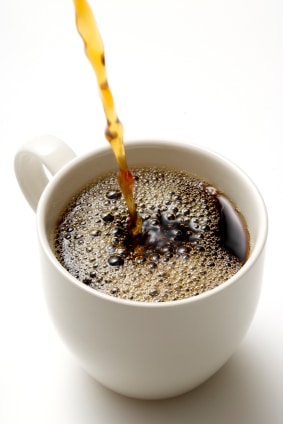 Athletes are always looking for a way to boost their performance, and caffeinated beverages such as coffee are a popular way to “fuel up” before a workout. Caffeine can certainly perk you up and make you more alert, but what effect does it have on exercise performance?
Athletes are always looking for a way to boost their performance, and caffeinated beverages such as coffee are a popular way to “fuel up” before a workout. Caffeine can certainly perk you up and make you more alert, but what effect does it have on exercise performance?
Caffeine and Exercise
Research shows that caffeine improves endurance and boost speeds in endurance events that involve running, rowing or cycling. It doesn’t take large doses of caffeine to get this benefit either. You can get benefits with doses of caffeine as low as 3 milligrams per kilogram of body weight. For a 150 pound person, that’s 200 milligrams of caffeine, the amount in about 2 cups of coffee. The ergogenic effects of caffeine are even greater if you refrain from drinking coffee for 7 days before an event so your body doesn’t develop tolerance.
Caffeine boosts performance during exercise that requires short bursts of high-intensity activity, although the benefits are relatively short-lived. It also reduces muscle pain and discomfort during high-intensity exercise, meaning it may help you push a little harder than you normally would. This is true even in people who drink coffee daily and would normally have some tolerance to its effects.
How Does Caffeine Boost Exercise Performance?
The exact way caffeine increases endurance and reduces muscle pain during exercise isn’t clear. Caffeine blocks receptors in the brain that bind adenosine, a chemical produced by the brain that slows down brain activity. When the receptors are blocked and adenosine can’t bind to them, it increases mental alertness.
Caffeine also increases the activity of a hormone called adrenaline that stimulates the release of glucose from the liver and increases the delivery of fat to muscles to be used as fuel. It also speeds up the heart rate. Adrenaline gives athletes that extra drive to win. Another theory is that caffeine boosts performance by increasing levels of fatty acid delivery to muscles be used as fuel. When these fatty acids are readily available, it spares the use of glycogen stores.
The Disadvantages of Drinking Coffee before Working Out
Not everyone responds favorably to caffeine. It can cause anxiety, nervousness, and shakiness that decreases performance, and some people experience stomach acidity and digestive upset when they drink coffee. It can also trigger heart palpitations and elevations in blood pressure in some people. Caffeine is a diuretic, which could be a problem if you’re drinking it before a long-distance run. If you drink coffee before working out, limit the amount to no more than 2 cups. There’s no evidence that consuming greater amounts offer any additional benefits.
The Bottom Line?
Consuming caffeine before and during exercise can boost endurance in long-term events and increase performance in sports that require short bursts of high-intensity activity. It also reduces muscle pain during exercise, which helps you go longer and harder. If you drink coffee before a workout, do it in moderation, and don’t do it if you have medical problems such as high blood pressure.
References:
Institute for Scientific Information on Coffee. “Coffee and Health”
Astorino T.A. et al. (2009), J. Efficacy of Acute Caffeine Ingestion for short-term high-intensity exercise performance: A Systematic Review. Strength and Conditioning Research
J Strength Cond Res. 2009 Jan;23(1):315-24.
Science Daily. “Caffeine Reduces Pain during Exercise, Study Shows”
Related Articles By Cathe:
How Much Can Caffeine Improve Exercise Performance? It Depends on This
Why Caffeine after a Workout Has Potential Benefits
Should You Drink Coffee Before a Workout & If So, When?
Why Energy Drinks and Exercise Don’t Mix
How Does Caffeine Affect High-Intensity Exercise Performance?

